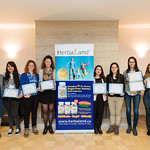Deadline January 15th, 2024 at 11:59pm. No late abstracts will be accepted.
All abstracts must be submitted electronically via the submission portal under the “Abstract Submission” tab of this website. Please review the Guidelines before submitting an abstract.
Each abstract should contain:
Additional abstract information
|
Abstract Submission Guidelines
Abstracts must be submitted as a .doc or .docx file format. This file should include the following: Title, authors, author affiliations, abstract (max. 400 words), funding sources, and a word count). An example, below, has been included for reference (please follow this format):
Abstract ExampleDetermination of vitamin B-12 status using methylmalonic acid concentrations in dried blood spots Theresa H. Schroder1, Teo Quay1, Yvonne Lamers1 1. Food, Nutrition and Health, Faculty of Land and Food Systems, University of British Columbia, Vancouver, BC V6T 1Z4, Canada Marginal vitamin B-12 (B-12) deficiency has been associated with an increased risk of adverse pregnancy outcomes and cognitive decline. About 10 % of the US population and 30 % of the Canadian population show inadequate B-12 status. Methylmalonic acid (MMA) is a functional biomarker for B-12 status and a sensitive indicator for marginal B-12 deficiency. To date, MMA concentrations are measured in plasma samples obtained from venipuncture. Dried blood spots (DBS) allow non-invasive, simple collection of biological samples with no need of immediate processing or special storage. The goal of this study was to establish an analytical method for quantification of MMA in DBS and to validate it against plasma MMA concentrations. Using liquid chromatography – tandem mass spectrometry, we developed a simple, low-cost assay that shows high imprecision (CV < 1.2 %) and recovery (95 %). In 73 females (19 – 30 y), mean (± SD) plasma MMA concentration was 163 ± 65 nmol/L (74 – 458 nmol/L) and corresponding DBS MMA concentration was 36.4 ± 11 pmol/DBS. There was a strong correlation between plasma and DBS MMA concentrations (R = 0.90, P < 0.001). In conclusion, MMA analysis in DBS has the potential to be a reliable and more practical alternative in B-12 screening and to thereby enable B-12 status assessment in large-scale population-based surveys and in populations living in less accessible areas. Supported by ‘FNH Vitamin Research Fund’ UBC Word Count: 223 words |
Oral and Poster Competition
All submitted abstracts which have indicated that they would like to be considered for competition will be anonymized and sent for review to faculty or post docs (or a different field). Each abstract will be reviewed twice, and presenters for both competitions will be selected based on reviewer recommendations.
Students who will be eligible to participate in the oral and poster competitions will be contacted directly on the day the abstract results are released, and their names will be posted on this website.
Awards
The Dean will present an award for the 1st and 2nd place winners of the poster and oral competitions. Please indicate on the registration page if you wish to be considered for the competition (during abstract review).
Support
Technical questions regarding electronic submission should be directed to the Conference Coordinators at lfsgrads@gmail.com.




